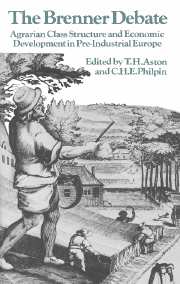Book contents
- Frontmatter
- Contents
- Preface
- Introduction
- 1 Agrarian Class Structure and Economic Development in Pre-Industrial Europe
- 2 Population and Class Relations in Feudal Society
- 3 Agrarian Class Structure and the Development of Capitalism: France and England Compared
- 4 Peasant Organization and Class Conflict in Eastern and Western Germany
- 5 A Reply to Robert Brenner
- 6 Against the Neo-Malthusian Orthodoxy
- 7 A Crisis of Feudalism
- 8 In Search of Agrarian Capitalism
- 9 Agrarian Class Structure and Economic Development in Pre-Industrial Bohemia
- 10 The Agrarian Roots of European Capitalism
- Index
- Past and Present Publications
6 - Against the Neo-Malthusian Orthodoxy
Published online by Cambridge University Press: 27 October 2009
- Frontmatter
- Contents
- Preface
- Introduction
- 1 Agrarian Class Structure and Economic Development in Pre-Industrial Europe
- 2 Population and Class Relations in Feudal Society
- 3 Agrarian Class Structure and the Development of Capitalism: France and England Compared
- 4 Peasant Organization and Class Conflict in Eastern and Western Germany
- 5 A Reply to Robert Brenner
- 6 Against the Neo-Malthusian Orthodoxy
- 7 A Crisis of Feudalism
- 8 In Search of Agrarian Capitalism
- 9 Agrarian Class Structure and Economic Development in Pre-Industrial Bohemia
- 10 The Agrarian Roots of European Capitalism
- Index
- Past and Present Publications
Summary
Robert Brenner's article has a dual merit: first, it courageously attacks the Malthusian model; and second, it stresses the decisive role of the class struggle in long-term economic evolution, notably in the pre-industrial phase of European history. On these two points I would support him, but without agreeing with his reasoning and while radically disagreeing with his methodological orientation.
Let me first emphasize the points on which we agree. Like him, I deplore the fact that the Malthusian model should have become the orthodox one. Served by the reputation of the historians who defend it, it is crushing our historiography in its tentacles. The majority of research workers in the medieval and modern periods draw their inspiration from it, either implicitly or explicitly, and no longer even feel it necessary to justify it. If perchance another analysis challenging this orthodoxy is advanced, efforts are immediately made to reintegrate the intruder into the Malthusian fold. In such a way has it been possible to represent my own Crise du féodalisme as an illustration and confirmation of the work of Postan and Le Roy Ladurie. And in this particular case, the “salvage” attempt rests simply on the fact that I observed in Normandy secular fluctuations in population, production, prices, wages and the like, which closely approximated those recorded in England, Languedoc and Germany.
A second point of agreement between Brenner and myself lies in the importance given to social relationships in the evolution of medieval and modern Europe. It is here in fact that the shoe pinches in the Malthusian analysis.Not that Post an and Le Roy Ladurie want to turn the social dimension into an abstraction, as Brenner implies.
- Type
- Chapter
- Information
- The Brenner DebateAgrarian Class Structure and Economic Development in Pre-industrial Europe, pp. 107 - 118Publisher: Cambridge University PressPrint publication year: 1985
- 8
- Cited by



